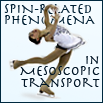Speaker
Ming-Wei Wu
Description
In this talk we are going to present our theoretical
investigations on spin dynamics of semiconductors and
graphene under various conditions. It is shown from a fully
microscopic kinetic-spin-Bloch-equation (KSBE) approach that
the single-particle approach is inadequate in accounting for
the spin relaxation/dephasing (R/D) both in the time domain
and the spacial domain. The momentum dependence of the
effective magnetic field (the Dresselhaus and the Rashba
terms) and the momentum dependence of the spin diffusion
rate along the special gradient all serve as inhomogeneous
broadenings. It is pointed out that in the presence of
inhomogeneous broadening, any scattering, including the
carrier-carrier Coulomb scattering, can cause irreversible
spin R/D. Moreover, besides the spin R/D channel the
scattering provides, it also gives rise to the counter
effect to the inhomogeneous broadening. The scattering tends
to drive carriers to a more homogeneous states and therefore
suppresses the inhomogeneous broadening. Finally, this
approach is valid in both strong and weak scattering regime
and can be used to study systems far away from the
equilibrium such as electrons of high spin polarization
and/or electrons with strong electric field (hot electrons).
Many novel effects are predicted from our theory and some
have been realized experimentally very recently.

